- europages
- >
- COMPANIES - SUPPLIERS - SERVICE PROVIDERS
- >
- spherical lenses
Results for
Spherical lenses - Import export

KNIGHT OPTICAL (UK) LTD
United Kingdom
Knight Optical offer a range of Stock Ball Lenses and Half Ball Lenses, for use within Fibre Lasers. As the name suggests ball lenses are completely spherical lenses mostly made out of High Refractive Index Glass such as Sapphire, and LASFN-9 Glass. The reason ball lenses are most commonly used is for their ability to focus light when leaving a fibre optic, so that it can therefore be used for a laser application. The key feature of ball lenses is their short back focal length allowing for precision coupling where size or space is a limiting factor in the system. Ball lenses are typically used in pairs with one lens acting as a collimator for the second to focus the light back into the coupled fibre. Where a more compact solution is required a half-ball lens is typically more suitable. We hold a large inventory of Ball Lenses. •Stock sizes from 0.5 5mm to 10mm diameter. •Custom sizes available to quotation. •Half Ball lenses also available.
Request for a quote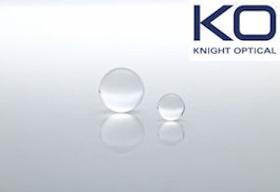
KNIGHT OPTICAL (UK) LTD
United Kingdom
Knight Optical offer a range of Stock Ball Lenses and Half Ball Lenses, for use within Fibre Optics, Signal Coupling and Barcode Scanners. As the name suggests ball lenses are spherical lenses mostly made out of High Refractive Index Glass such as Sapphire, and LASFN-9 Glass. The reason ball lenses are most commonly used is for their ability to couple light in and out of fibres. The key feature of ball lenses is their short back focal length allowing for precision coupling where size or space is a limiting factor in the system. Ball lenses are typically used in pairs with one lens acting as a collimator for the second to focus the light back into the coupled fibre. Where a more compact solution is required a half-ball lens is typically more suitable. We hold a large inventory of Ball Lenses. •Stock sizes from 0.5 5mm to 10mm diameter. •Custom sizes available to quotation. •Half Ball lenses also available. For more information read PDF….
Request for a quote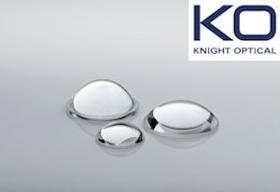
KNIGHT OPTICAL (UK) LTD
United Kingdom
Knight Optical We can offer Custom Moulded Aspheric Lenses for use with Laser Diode Collimators. Aspheric lens surfaces are used to correct spherical aberration (where the converging light from a lens does not have a common focal point, resulting in a distorted image) in lasers and imaging. Traditional spherical lenses cannot collimate light effectively because even small angles of incidence can produce spherical aberrations. This can mean that several components may be required to get the desired result. The non-spherical surface of an aspheric lens allows a single component to effectively focus or collimate even highly divergent emissions, potentially replacing a multi-lens system with a single aspheric lens. Therefore Aspheric Lenses that are moulded are ideal for use within laser diode-to-fibre coupling applications. For more information read PDF ….
Request for a quote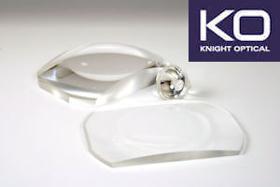
KNIGHT OPTICAL (UK) LTD
United Kingdom
We can supply you with a custom made Diamond turned aspheric lenses for use within Thermal Imaging Cameras. Thermal Imaging Cameras work similarly to traditional visible camera systems; while traditional cameras form images using visible light; thermal cameras form images using infrared radiation; operating in wavelengths as long as 14µm. Spherical aberration occurs in common singlet lenses, which results in an image that appears distorted, aspheric lenses correct spherical aberration. An aspheric lens surface is designed non-spherical, which allows a single component lens to collimate or focus highly divergent rays, potentially replacing a multi-lens system. This in turn provides the camera system with a better image quality. Knight Optical offers diamond turned aspherics from a range of infrared materials including Germanium (Ge), Calcium Fluoride (CaF₂), Zinc Sulphide (ZnS), Zinc Selenide (ZnSe), Aluminium (Al) and chalcogenide glasses like AMTIR (Ge33As12Se55 ) PDF FOR INFO
Request for a quote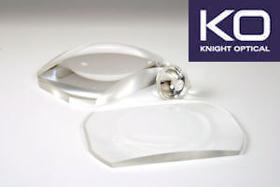
KNIGHT OPTICAL (UK) LTD
United Kingdom
Knight Optical can supply you with custom made Diamond turned aspheric lenses for use within autonomous vehicle LiDAR systems. Autonomous vehicle LiDAR systems create driverless cars. Whereby the system produce autonomous vehicles which can perform complex manoeuvers and drive in public with little or no input from a user. Spherical aberration occurs in common singlet lenses, which results in an image that appears distorted, aspheric lenses correct spherical aberration. An aspheric lens surface is designed non-spherical, which allows a single component lens to collimate or focus highly divergent rays potentially replacing a multi-lens system. This in turn provides the LiDAR system with a better signal quality, at lower costs whilst making the system more compact. Knight Optical offers diamond turned aspherics from a range of suitable NIR materials for autonomous vehicle LiDAR including N-BK7 or equivalent, sapphire, quartz, UV fused silica, amongst others. SEE PDF
Request for a quoteDo you sell or make similar products?
Sign up to europages and have your products listed
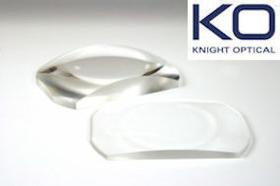
KNIGHT OPTICAL (UK) LTD
United Kingdom
Knight Optical can supply you with a custom made Diamond turned aspheric lenses for use within Thermal Imaging Cameras. We supply a range of diamond turned aspherics for a range of applications. All individually QA checked and metrology tested for quality to ensure parts meet customer specification. Supplied in a range of sizes and shapes with custom coatings tailored to meet your individual applications. Thermal Imaging Cameras work similarly to traditional visible camera systems; while traditional cameras form images using visible light; thermal cameras form images using infrared radiation; operating in wavelengths as long as 14µm. Spherical aberration occurs in common singlet lenses, which results in an image that appears distorted, aspheric lenses correct spherical aberration. An aspheric lens surface is designed non-spherical, which allows a single component lens to collimate or focus highly divergent rays, Read PDF for more information…
Request for a quoteResults for
Spherical lenses - Import exportNumber of results
7 ProductsCountries
Company type